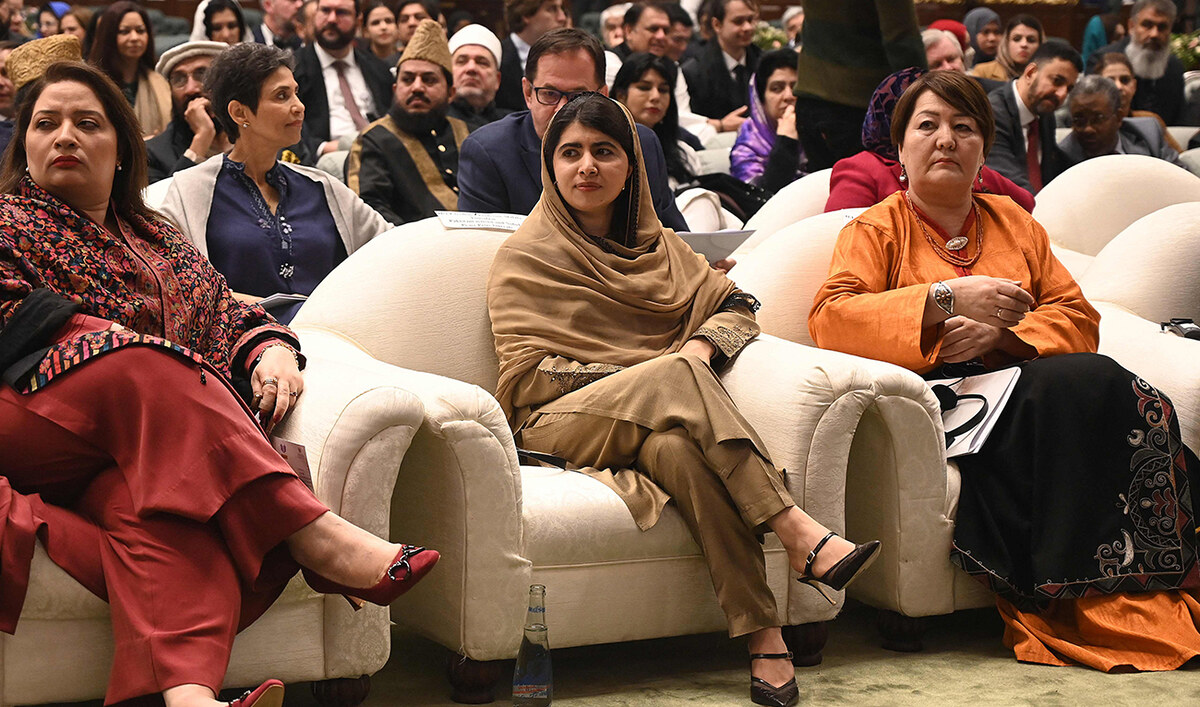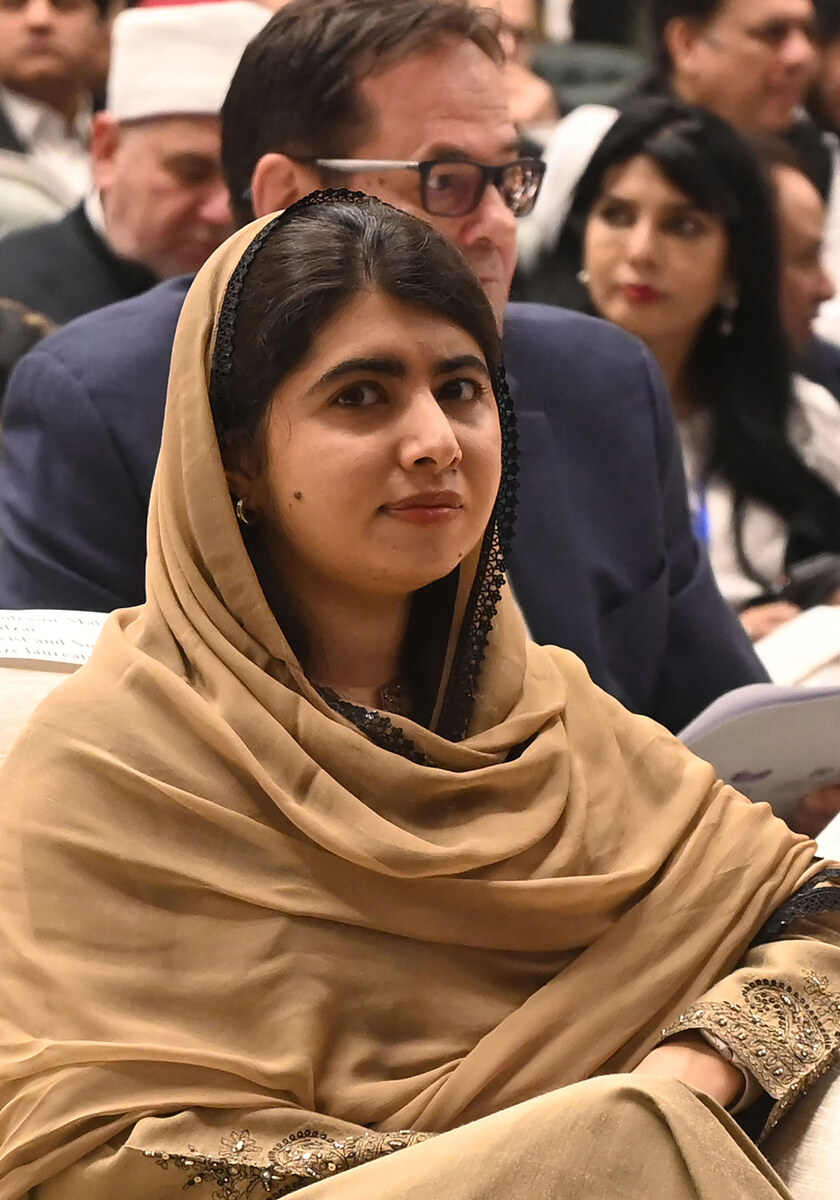ISLAMABAD: Educational institutions across Pakistan’s most populous Punjab province, except for Lahore and Multan divisions, will reopen tomorrow, according to a notification issued by the province’s Environmental Protection Agency on Monday, following an improvement in air quality as smog conditions eased.
Toxic smog began affecting various cities in Punjab last month, as cold air trapped dust, diesel fumes and smoke from illegal stubble burning. In response, provincial authorities closed schools, restricted heavy transport on designated days and banned access to public spaces such as parks and playgrounds.
“The ambient air quality has improved in most districts of Punjab, due to rain in upper parts of Punjab, change in wind direction and speed,” the notification, signed by the EPA director general, said. “Therefore, all the educational institutions, except [in] Lahore and Multan divisions, shall be opened [with effect from] 19-11-2024 (Tuesday) with physical presence of students/staff.”
The notification announced students and staff must adhere to safety protocols, including wearing face masks, while outdoor sports and co-curricular activities would remain banned until further notice.
The decision follows weeks of severe smog that forced authorities in Punjab to close schools or shift them to online learning in several districts.
Smog has been a recurring problem during the winter months in the country, with authorities yet to find a sustainable solution to the crisis.
Earlier this month, NASA’s satellite imagery revealed a dense layer of smog stretching between Pakistan’s Lahore and India’s New Delhi, underscoring the severity of the environmental crisis.
The development has prompted climate experts to demand urgent action, as Pakistan’s meteorological department forecasts smog to persist until mid-December.
With schools reopening in most districts of Punjab, the EPA emphasized the importance of continued vigilance and compliance with safety measures, warning that smog could return if weather patterns shift or mitigation efforts are relaxed.
Pakistan’s Punjab to reopen schools from tomorrow as air quality improves in most districts
https://arab.news/r2md6
Pakistan’s Punjab to reopen schools from tomorrow as air quality improves in most districts

- Province’s Environmental Protection Agency says its directive is not for Lahore and Multan where smog persists
- Smog has been a recurring problem during winter months, with authorities yet to find any sustainable solutions
Northwestern Pakistani province says 10 workers killed in coal mine collapse in country’s southwest

- The mine in Sanjdi coal field in Pakistan’s southwestern Balochistan province collapsed after a methane gas explosion on Thursday
- Mines in Balochistan are known for hazardous working conditions and poor safety standards, where deadly incidents are not uncommon
ISLAMABAD: Ali Amin Gandapur, chief minister of Pakistan’s Khyber Pakhtunkhwa province, said on Saturday that 10 residents of his province were among 12 workers killed in a coal mine collapse in the country’s southwest.
The mine in the Sanjdi coal field in Pakistan’s southwestern Balochistan province collapsed after a methane gas explosion on Thursday and a dozen miners were trapped inside it, according to the Balochistan mining department.
Rescue teams from the Balochistan mining department and the Provincial Disaster Management Authority (PDMA) recovered bodies of four miners on Friday, following an hours-long effort.
In a statement issued from his office, CM Gandapur said ten of the deceased miners hailed from the Shangla district of the Khyber Pakhtunkhwa province.
“We share the grief of the bereaved families,” the chief minister was quoted as saying by his office.
On Friday, Balochistan Chief Mines Inspector Abdul Ghani said the workers had been digging coal at 4,000 feet inside the mine, adding that the entire mine had caved in due to the intensity of the gas explosion.
“The mining department will conduct a thorough investigation to assess what kind of safety measures were put in place by the private mine owners,” he told Arab News.
Mines in Balochistan, which are operated by private companies under lease agreements with the government, are known for hazardous working conditions and poor safety standards, where deadly incidents are not uncommon.
At least 82 coal miners working on different projects were killed in Balochistan in 46 accidents last year, according to the Balochistan mining department.
Pakistan calls on world bodies to join hands for sustainable solutions for girls’ education

- The call came from PM Shehbaz Sharif at the opening session of a summit on girls’ education in Muslim countries
- The two-day conference aims to stress Islam’s message that both men and women have the right to education
ISLAMABAD: Prime Minister Shehbaz Sharif on Saturday urged international organizations and philanthropists to join hands to find sustainable solutions for the education of girls as Pakistan opened a two-day summit to discuss girls’ education in Muslim communities.
The global summit, which aims to find ways to advance girls’ education across the Muslim world, is being attended by over 150 dignitaries from 44 Muslim and other friendly states, according to Pakistan’s foreign office.
The primary aim of the conference is to stress the implementation of the Islamic message that both men and women have the right to education, according to Pakistan Education Minister Khalid Maqbool Siddiqui, whose ministry is hosting the event.
In his keynote address at the opening session, PM Sharif said ensuring equitable access to education for girls is one of the most “pressing challenges” facing the world.
“I call upon both global and Pakistani organizations, philanthropists and entrepreneurs to join us in creating scalable and sustainable solutions for girls’ education,” the prime minister said.
“Over the next decade, millions of young girls will enter the job markets [so] as they do so, they have the potential not just to lift themselves, their families and their nations out of poverty, but also to enrich the global economy, create new markets and find innovative solutions to our shared challenges.”
The Pakistan premier thanked Saudi Arabia’s King Salman and Crown Prince Crown Prince Mohammed bin Salman for their support and patronage of the conference.
“The pursuit of knowledge is a sacred duty for every Muslim, regardless of gender, as emphasized by Prophet Muhammad (Peace Be Upon Him),” he said.
“His (PBUH) awe-inspiring message was preached in a society which was still in darkness and even in denial of the basic rights of women to exist in the world. In response to these great injustices, Islam introduced a transformative social paradigm.”
Sharif said the Muslim world, including Pakistan, faces significant challenges in ensuring equitable access to education for girls.
In Pakistan, he said, women make up more than half of the total population, yet the female literacy rate stands at only 49 percent and alarmingly, around 22.8 million children in the age bracket of five to 16 years are out of school, with a disproportionate number being girls.
“Denying education to girls is tantamount to denying them their voice and their choice, while depriving them of their right to a bright future,” he said, highlighting various initiatives undertaken by his government for the education of girls.
The Pakistan premier gave the examples of Fatimah Jinnah, sister of Pakistan’s founder Muhammad Ali Jinnah, Benazir Bhutto, first woman PM in the Muslim world, and Maryam Nawaz Sharif, first woman chief minister of a Pakistani province, saying they all inspired women participation in politics and socio-economic future of the country.
“History is witness to the determination and resilience of women who have thrived even within the limited spaces afforded to them, breaking the shackles of societal servitude and leaving and indelible mark on society,” he added.
Several dignitaries, including Organization of Islamic Cooperation (OIC) Secretary-General Hissein Brahim Taha and Egyptian Grand Mufti Dr. Nazir Mohamed Ayad, are attending the two-day summit.
On Saturday, Nobel Peace Prize laureate Malala Yousafzai said she was “overwhelmed” to be back in her native Pakistan as she arrived to attend the conference in Islamabad.
“I’m truly honored, overwhelmed and happy to be back in Pakistan,” she told AFP.

Pakistan also extended an invitation to Afghanistan to join representatives from other Islamic countries and attend the conference in Islamabad.
“We had extended an invitation to Afghanistan but no one from the Afghan government was at the conference,” Education Minister Khalid Maqbool Siddiqui told AFP.
Since the Taliban’s return to power in 2021, at least 1.4 million Afghan girls have been denied access to secondary education, according to a report by the United Nations International Children’s Emergency Fund (UNICEF) released in August last year.
An “Islamabad Declaration” will be announced at the end of the conference on Sunday that would outline decisive steps to transform girls’ education in Islamic countries.
With additional comments from AFP
OIC’s COMSTECH launches ‘expert service’ to foster tech cooperation among member states

- COMSTECH, an intergovernmental body, aims to promote science and technology, focusing on sustainable development and poverty reduction
- The strategic initiative is designed to enhance technological self-reliance, foster development, and mitigate brain drain in OIC member states
ISLAMABAD: The Organization of Islamic Cooperation’s (OIC) Ministerial Standing Committee on Scientific and Technological Cooperation (COMSTECH) has launched an “expert service” to foster technological cooperation among OIC member states, the committee said on Friday.
COMSTECH, an intergovernmental organization established by the OIC in 1981, is headquartered in Islamabad and continues to serve as a cornerstone of the OIC’s mission to promote scientific excellence and technological innovation, focusing on sustainable development, poverty reduction, and improvement in quality of life across member states.
The service was launched during OIC Secretary-General Hissein Ibrahim Taha’s visit to the COMSTECH Secretariat in Islamabad along with Pakistan’s Science and Technology Minister Khalid Maqbool Siddiqui. The high-profile event was attended by ambassadors of OIC member states, diplomats, vice-chancellors, government officials, scientists, and researchers from various OIC countries.
Launching the COMSTECH Expert Service for Technological Cooperation, Secretary-General Taha emphasized the importance of collaboration among OIC member states in the critical fields of science and technology to overcome the key challenges faced by the Muslim world, according to COMSTECH.
“This strategic initiative is designed to enhance technological self-reliance, foster sustainable development, and mitigate brain drain within OIC member states,” the OIC body said in a statement.
“The program aims to mobilize expertise from across the Muslim world to address pressing challenges in health care, agriculture, energy, and education, embodying the spirit of collaboration and mutual progress among OIC countries.”
The OIC chief said the upcoming 16th COMSTECH General Assembly, scheduled to be held in Islamabad later this year, would be a vital platform to discuss the future of science and technology in the OIC region.
“COMSTECH is a beacon of hope, empowering individuals and communities through groundbreaking initiatives,” he said. “I urge all member states to support and actively engage in these programs to collectively create a brighter and more prosperous future for the OIC community.”
On the occasion, Siddiqui reaffirmed the importance of science and technology as fundamental pillars for sustainable development within the OIC.
He termed the launch of the COMSTECH Expert Service a “pivotal step in uniting expertise across the Muslim world to address shared challenges and build resilience.”
Malala Yousafzai ‘overwhelmed and happy’ to be back in Pakistan

- The education activist was shot by the Pakistani Taliban in 2012 when she was a schoolgirl
- She has arrived for a global summit in her home country on girls’ education in Islamic world
ISLAMABAD: Nobel Peace Prize laureate Malala Yousafzai said Saturday she was “overwhelmed” to be back in her native Pakistan, as she arrived for a global summit on girls’ education in the Islamic world.
The education activist was shot by the Pakistani Taliban in 2012 when she was a schoolgirl and has returned to the country only a handful of times since.
“I’m truly honored, overwhelmed and happy to be back in Pakistan,” she told AFP as she arrived at the conference in the capital Islamabad.

The two-day summit was set to be opened Saturday morning by Prime Minister Shehbaz Sharif, and brings together representatives from Muslim-majority countries, where tens of millions of girls are out of school.
Yousafzai is due to address the summit on Sunday.
“I will speak about protecting rights for all girls to go to school, and why leaders must hold the Taliban accountable for their crimes against Afghan women & girls,” she posted on social media platform X on Friday.
The country’s education minister Khalid Maqbool Siddiqui told AFP the Taliban government in Afghanistan had been invited to attend, but Islamabad has not received a response.

Afghanistan is the only country in the world where girls and women are banned from going to school and university.
Since returning to power in 2021, the Taliban government there has imposed an austere version of Islamic law that the United Nations has called “gender apartheid.”
Pakistan is facing its own severe education crisis with more than 26 million children out of school, mostly as a result of poverty, according to official government figures — one of the highest figures in the world.

Yousafzai became a household name after she was attacked by Pakistan Taliban militants on a school bus in the remote Swat valley in 2012.
She was evacuated to the United Kingdom and went on to become a global advocate for girls’ education and, at the age of 17, the youngest Nobel Peace Prize winner.
Pakistan Cricket Board inducts Inzamam-ul-Haq, Saeed Anwar and others in its Hall of Fame

- Inzamam was a member of Pakistan’s 1992 World Cup-winning team, while Misbah was part of the ICC Men’s T20 World Cup 2009 winning squad
- Mushtaq captained the team to first-ever Test win in Australia in 1977, while Anwar scored 194 against India to break Viv Richards’ record
ISLAMABAD: The Pakistan Cricket Board (PCB) has inducted former cricket greats Inzamam-ul-Haq, Misbah-ul-Haq, Mushtaq Mohammad and Saeed Anwar in its Hall of Fame, who join the likes of Abdul Qadir, AH Kardar, Fazal Mahmood, Imran Khan, Wasim Akram and Zaheer Abbas in the illustrious group.
Inzamam played international cricket from 1991 to 2007 and was a member of Pakistan’s 1992 World Cup-winning team, while Misbah, who represented Pakistan from 2001 to 2017, was part of the ICC Men’s T20 World Cup 2009 winning squad and guided the team to the No.1 spot in the ICC Test Team Rankings in 2016.
Mushtaq played for Pakistan from 1959 to 1979 and captained the team to its first-ever Test win in Australia in 1977, featured in inaugural ICC Men’s Cricket World Cup 1975 in England before coaching the Pakistan side to the ICC Men’s Cricket World Cup 1999 final – also in England. Saeed Anwar represented Pakistan from 1989 to 2003, amassing a total of 31 centuries and 68 half-centuries, including three centuries and three half-centuries across the 1996, 1999 and 2003 World Cups.
The four icons of the game were inducted following a voting process, which was participated in by Akram, Zaheer, former Pakistan captain Azhar Ali, former Pakistani women cricketers Bismah Maroof and Nain Abidi, and journalists Majid Bhatti, Mohi Shah, Mohammad Yaqoob, Nauman Niaz, Sawera Pasha and Zahid Maqsood.
“On behalf of the Pakistan Cricket Board, I extend heartfelt congratulations to these four cricketing legends on their well-deserved inductions into the PCB Hall of Fame,” PCB Chairman Mohsin Naqvi said in a statement.
“This honor represents a tribute to their outstanding contributions to Pakistan cricket and to the global game.”
The four stalwarts will be formally inducted into the PCB Hall of Fame during the course of the year when they will be presented with commemorative caps and specially-designed plaques, according to the PCB.
Inzamam said he was “deeply honored” to be inducted into the PCB Hall of Fame.
“My journey as a professional cricketer, representing Pakistan on the world stage for nearly 16 years,” he said in comments shared by the PCB.
“I owe immense gratitude to my fellow cricketers, dedicated support staff and my family, without whom this journey would not have been possible. Representing Pakistan during an era with such high-caliber players was a privilege and their influence played a vital role in my growth and development as a batter.”
In his statement, Misbah said that representing Pakistan was an “absolute privilege” and this recognition by the Pakistan Cricket Board served as the “perfect crowning achievement” of his journey.
“Being acknowledged by your parent organization, alongside the appreciation of cricketing experts and fellow players is both gratifying and fulfilling,” he said.
“It is a testament to the dedication, relentless effort and sacrifices that went into meeting the highest standards of international cricket and translating those preparations into memorable performances.”
Mushtaq said that to be honored and recognized 45 years after playing his last match for Pakistan was “truly humbling” for him.
“Being part of the Pakistan cricket team during its formative years was both exciting and rewarding,” he said. “I feel privileged to have played alongside and against some of the most outstanding cricketers and thorough gentlemen, who played hard while always upholding the true spirit of the game.”
Anwar, who struck three successive ODI centuries in Sharjah and scored 194 against India in Chennai to break Viv Richards’ long-standing record for the highest individual score in ODIs, said he was “deeply grateful” to the panel for inducting him into the PCB Hall of Fame.
“My journey had its challenges, but it was a privilege to face them head-on. Each match I played for Pakistan holds a special place in my heart, though missing out on the ICC Cricket World Cup 1992 remains a regret,” he said.
“This journey, filled with triumphs and lessons, wouldn’t have been complete without the overwhelming support of our fans and the camaraderie of my teammates.”













